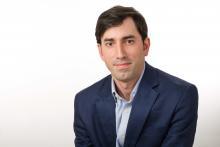The writer as creator: Wallace Stevens, Part one - Stevens and the Absolute
“I wonder if anyone in my generation is able to make the movements of faith?”
—Søren Kierkegaard[i]
As one who tries herself to put words on paper, in story, in an attempt to make sense of existence, I am interested in Wallace Stevens’ conclusions about the role of the poet as creator and how he views the poem, the creation, in its relationship to the Absolute.
In 1951, four years before his death in 1955, he said, “In an age of disbelief, or, what is the same thing, in a time that is largely humanistic, in one sense or another, it is for the poet to supply the satisfactions of belief, in his measure and in his style. . . . I think it is a role of the utmost seriousness. It is, for one thing, a spiritual role.”[ii]
Does he believe, when he says this, not only that one’s consciousness and expression through language are spiritual acts but also that poetry replaces belief in the absolute, or perhaps better stated, that poetry, or in Stevens’ parlance “the imagination,” is what we have in the absence of God?
Is the poet, in some sense, then, a stand-in for God when there is nothing else? I do not mean to imply by posing the question this way that Stevens saw himself as stand-in, or that he ever arrogantly asserted such, though his statement that I have quoted comes close. I assert that Stevens addressed the question of poet as creator, as stand-in for the Absolute, in both his poetry and his essays. I hope to examine here both his stance on this issue and the implications for me as his reader and as one who tries to write fiction and memoir.
To help with this difficult issue—writer as creator—I turn to two fiction writers who also write critical essays and who, in my view, span a continuum of thought on the role of literature in the struggle for belief: William Gass and Cynthia Ozick. In their essays both have grappled with this question head-on, much the way Stevens has in his essays. But it is clearer to me, than with Stevens, where each of them comes out.
Gass says “Novelist and philosopher are both obsessed with language, and make themselves up out of concepts. Both in a way create worlds … . They are divine games.”[iii]
It strikes me that he sounds a bit like Stevens with the notable exception that Stevens asserts the “utmost seriousness” of this spiritual role, while Gass makes clear his absurdist stance in the phrase “divine games.”
Gass is also clear that this “game,” one’s consciousness through language, is all there is for him: “A word is a concept made flesh, if you like—the eternal presented as voice.”[iv]
And if one hasn’t gotten his point yet, he adds, “… [T]o create a character is to give meaning to an unknown X; it is absolutely to define; and since nothing in life corresponds to these Xs, their reality is borne by their name. They are, where it is.”[v]
Cynthia Ozick seems to me to lie at the other end of the continuum, if you will. Though she is an admirer of Gass[vi] (I believe because of the clarity of his stance). Ozick says, “When art is put in competition, like a god, with the Creator, it too is turned into an idol.”[vii]
She has no countenance with idols, and it is the seductiveness of literature as idol that concerns her: “An idol can have above all, a psychological realism that is especially persuasive and seductive.”[viii]
She invokes the Second Commandment (against idols) to make both her belief in the Creator and her stance on literature as idol clear: “The Second commandment is more explicit than the Sixth, which tells us simply that we must not kill; the Second Commandment tells us we must resist especially that killing which serves our belief. In this sense there are no innocent idols.”[ix]
And she concludes, “Literature, one should have the courage to reflect, is an idol.”[x]
My aim here is to attempt to place Stevens on the continuum between the stance of Gass—consciousness through language is all we have, “where it is,” as he says—and Ozick—literature as idol is “seductive” and her assertion that “the recovery of Covenant can be attained only in the living-out of the living Covenant; never among the shamanistic toys of literature.”[xi]
The issue here is not who is right or wrong. Ozick would, I believe, defend Gass’s stance because it is clear.
Gass says, “Perhaps all we have now is a hand—my pure palm and your dirty bones—but perhaps it is better to end with a hand than a whole world. How much applause has God got for all His trouble over the years?”[xii]
The issue is whether the writer knows where he stands on this continuum. Does he know what he thinks and has he confronted the implications in terms of the Absolute, the ultimate “Other”?
It seems to me that the writer who has concluded, as I believe Gass has, that the word, out of his own consciousness, is all must come to that place through a profound questioning and rejection of the Absolute.
It is my contention that Stevens lies on this continuum very close to Gass, but that he has not confronted the absurdist implications of that stance.
One cannot have it both ways: If the writer who creates in words and whose subject is the nature and meaning of existence—and I believe this is Stevens’ subject—if this writer concludes there is nothing but human consciousness, then he must also, at the very least, confront faith as an insurmountable abyss.
It is clear to me that Stevens holds language as paramount, that he recognizes the limitations of language and, although he does so with a measure of humility, he does not confront the abyss that, by implication, must result.
I do not criticize him for not being able to make what Kierkegaard calls the “movements of faith,” but for not seeing that that is the problem—the ultimate question of existence.
A bibliography in five parts - Please click here for part two.
[i] Søren Kierkegaard, Fear and Trembling, ed. and trans. Howard V. Hong and Edna H. Hong (New Jersey: Princeton University Press, 1983), p. 34.
[ii] Wallace Stevens, “Two or Three Ideas,” Opus Posthumous, ed. Samuel French Morse (New York: Vintage Books, 1982) p. 206.
[iii] William Gass, “Philosophy and the Form of Fiction,” Fiction and the Figures of Life (New York: Vintage Books, 1971), p. 4.
[iv] Gass, “The Medium of Fiction,” Fiction and the Figures of Life, p. 29.
[v] Gass, “The concept of Character in Fiction,” Fiction and the Figures of Life, p. 50.
[vi] Cynthia Ozick, “Literature as Idol: Harold Bloom,” Art and Ardor (New York: Alfred A. Knopf, 1983) p. 179. Ozick refers to Gass here in a relevant passage on the role of poetry, and thus I view this passage worth quoting: “The ideal of ‘the poem itself’ has been with us for so long now, and is so bracing, that it is difficult to dislodge. Nevertheless it is true that biography and psychology have begun to seep back into academic readings of texts, and some belletrists—one thinks immediately of William Gass—have even dared to revive the subjective style of impressionism, wherein the criticism of the text vies as a literary display with the text itself, and on a competitive of virtuosity, even of ‘beauty.’”
[vii] Ibid., p.191. I should note here that Ozick’s essay is, in part, an attack on Harold Bloom’s style of criticism and on what she views as his inability to separate art from idol: “Bloom invents subversion after subversion, until he comes at last to the job of idol-making” (p. 187). I shall not deal with this aspect of Ozick’s essay because I believe what she has done here is considerably larger. I should note also that I will use Bloom, a noted Stevens’ scholar, to help explicate Stevens’ poems.
[viii] Ibid., pp. 188-9.
[ix] Ibid., p.190.
[x] Ibid., p. 196.
[xi] Ibid., p. 199.
[xii] William Gass, “The Ontology of the Sentence,” The World Within the Word (New York: Alfred A. Knopf, 1979), p.338. (Note: These are Gass’s last words in this volume.)
This article is brought to you by the author who owns the copyright to the text.
Should you want to support the author’s creative work you can use the PayPal “Donate” button below.
Your donation is a transaction between you and the author. The proceeds go directly to the author’s PayPal account in full less PayPal’s commission.
Facts & Arts neither receives information about you, nor of your donation, nor does Facts & Arts receive a commission.
Facts & Arts does not pay the author, nor takes paid by the author, for the posting of the author's material on Facts & Arts. Facts & Arts finances its operations by selling advertising space.

















